Internet Ads Click With Candidates
- Share via
WASHINGTON — Not long ago, a politician wanting to appear technologically savvy simply created a Web site to post information for the browsing public. But now, those seeking to be up to date are taking the next step: advertising online.
The movement has caught the attention of presidential candidates who see in the Internet a venue for quick, inexpensive and highly targeted connections to potential voters--in essence, cyber-handshakes.
This week Democrat Bill Bradley became the latest presidential candidate to launch Internet ads; his buys target juno.com users in California, Iowa and New Hampshire and Microsoft’s Hotmail clients in Iowa.
One such Bradley “banner” ad begins with a teaser, “Tired of politics as usual?” It then flips to another message with a picture of Bradley and a link to his Web site: “I am. See what I’m going to do about it.”
Vice President Al Gore, the Democratic front-runner, ran online ads in June to promote a live Webcast of his campaign kickoff and plans to run more in the future, his aides said.
On the Republican side, George W. Bush and John McCain also have placed flashing banner advertisements on commercial Web sites. One of the Bush ads lets computer users calculate how much they would save under his tax cutting plan. A McCain ad helped him round up volunteers for a petition drive to put him on the Virginia primary ballot.
“We’re in an age where more and more people are getting their information from the Internet, and this is just one more way to reach people,” said Kristen Ludecke, a Bradley spokeswoman.
Television, to be sure, remains the cornerstone of national political advertising. However, while online advertising is in a nascent stage in the presidential campaign, it is becoming a potent communication tool in other political arenas.
Last month Rep. Bob Riley (R-Ala.) became the first member of Congress to send his constituents a video e-mail through franking, the long-established custom that is essentially taxpayer-funded advertising. What’s more, lobbyists are using increasingly sophisticated Internet ads and e-mail solicitations to drum up grass-roots uprisings on issues before Congress and the administration.
The emergence of e-politics was inevitable in a time when the online population is exploding. In December, a Harris Poll reported that 56% of all U.S. adults are now online.
But how far online political advertising will develop this year remains to be seen. Candidates accustomed to winning elections by advertising via television, radio and direct mail must be persuaded that spending precious campaign dollars on a relatively untested new medium makes sense.
Naturally, a new breed of image peddlers has sprung up to help politicians make sense of it all: the Internet political media consultant. One is Pam Fielding, principal in a new dot-com business called e-advocates, based in Virginia, which helps interest groups spread their message. Last year she helped the Assn. of American Medical Colleges run Internet ads aimed at convincing people with an interest in health issues to lobby Congress to restore Medicare funding cut from teaching hospitals. Within two weeks, outraged users had fired off 17,000 e-mails to Capitol Hill.
“If you ignore the Internet, you really do so at your peril and the peril of your issues in the Digital Age,” Fielding said. “I would never suggest we should all throw away our direct-mail lists, get rid of our phones and stop having face-to-face meetings with members of Congress. But this has to be part of the strategy.”
For campaigns, Internet ads are both economically and tactically appealing.
McCain’s campaign was able to send an ad exclusively to Virginia registered voters from Dec. 9 to Dec. 16 for a mere $1,500. That bought McCain about 10,000 “impressions” of five different banner ads appearing on dozens of Web sites, said Max Fose, McCain’s Web site coordinator.
An impression, the basic unit of online advertising, is defined as one instance of an ad appearing on-screen before a computer user. The ad garnered 198 “click-throughs”--a 2% response rate, which pleased McCain aides--and ultimately 97 activists to help him get on the state ballot.
McCain’s campaign has been working with a firm called Aristotle Publishing Inc., based in San Francisco and Washington, which has developed a technology that integrates nationwide voter lists with demographic information computer users have voluntarily supplied to Internet companies. That enables pinpoint targeting that is all but impossible to obtain with a television ad.
Members of Congress, deluged by e-mail in recent years, are starting to fire back on the Internet themselves. Riley, the Alabama congressman, gathered more than 1,000 e-mail addresses--getting permission from each constituent--for a holiday greeting he sent as a video e-mail. The video, packaged by eCommercial.com, based in Orange County, asked recipients to check out Riley’s Web site, forward the e-mail to a friend and contact him with suggestions for federal priorities. It cost little more than 15 cents per copy, less than the typical cost of a direct mailing.
About a quarter of the recipients clicked through to Riley’s Web site, an overwhelming rate of reply, said aide Dan Gans. “Unlike sending out a direct mail piece where you really don’t know how many people look at it and throw it in the trash, the nice thing is you get some feedback. I’ve never seen any kind of congressional mailer generate that type of enthusiasm and positive responses.”
(BEGIN TEXT OF INFOBOX / INFOGRAPHIC)
Banner Ideas
Online ads don’t have the impact of television, but candidates find that they are far cheaper and can reach tightly targeted audiences. Here are a few of the banner ads run by John McCain and George W. Bush:
More to Read
Get the L.A. Times Politics newsletter
Deeply reported insights into legislation, politics and policy from Sacramento, Washington and beyond. In your inbox twice per week.
You may occasionally receive promotional content from the Los Angeles Times.










